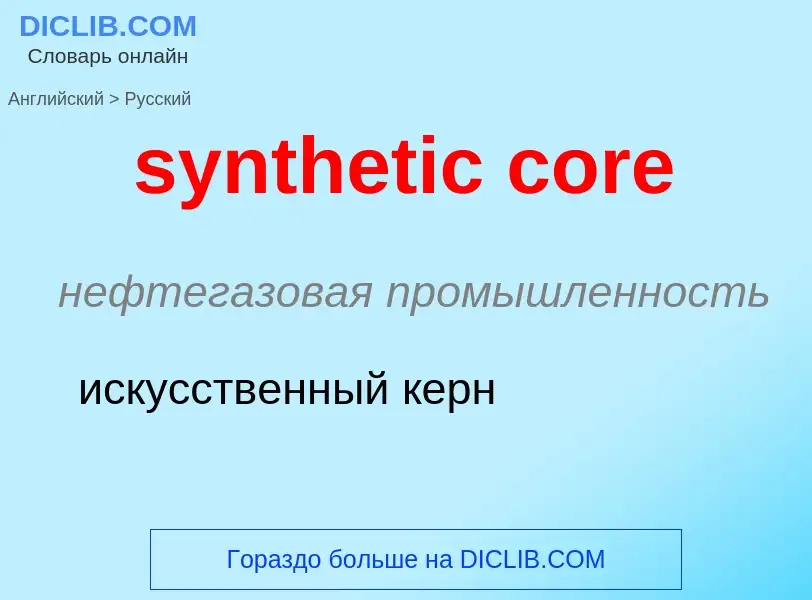Tradução e análise de palavras por inteligência artificial ChatGPT
Nesta página você pode obter uma análise detalhada de uma palavra ou frase, produzida usando a melhor tecnologia de inteligência artificial até o momento:
- como a palavra é usada
- frequência de uso
- é usado com mais frequência na fala oral ou escrita
- opções de tradução de palavras
- exemplos de uso (várias frases com tradução)
- etimologia
synthetic core - tradução para russo
нефтегазовая промышленность
искусственный керн
['kɔ:'mem(ə)ri]
общая лексика
ЗУ на магнитных сердечниках
тип ОЗУ, использовавшийся в ЭВМ второго поколения (конец 50-х, начало 60-х годов), вытеснен полупроводниковой памятью. Магнитный сердечник можно намагничивать в одном из двух направлений. Затем направление магнитного поля можно определять по его воздействию на электрический ток, проходящий через центр сердечника
вычислительная техника
запоминающее устройство ЭВМ на (магнитных) сердечниках
Смотрите также
Wikipédia
Synthetic oil is a lubricant consisting of chemical compounds that are artificially modified or synthesised. Synthetic lubricants can be manufactured using chemically modified petroleum components rather than whole crude oil, but can also be synthesized from other raw materials. The base material, however, is still overwhelmingly crude oil that is distilled and then modified physically and chemically. The actual synthesis process and composition of additives is generally a commercial trade secret and will vary among producers.
Synthetic oil is used as a substitute for petroleum-refined oils when operating in extreme temperature. Aircraft jet engines, for example, require the use of synthetic oils, whereas aircraft piston engines do not. Synthetic oils are also used in metal stamping to provide environmental and other benefits when compared to conventional petroleum and animal-fat based products. These products are also referred to as "non-oil" or "oil free".


![A 10.8×10.8 cm plane of magnetic core memory with 64 x 64 bits (4 Kb), as used in a [[CDC 6600]]. Inset shows ''word line'' architecture with two wires per bit A 10.8×10.8 cm plane of magnetic core memory with 64 x 64 bits (4 Kb), as used in a [[CDC 6600]]. Inset shows ''word line'' architecture with two wires per bit](https://commons.wikimedia.org/wiki/Special:FilePath/Ferrite core memory.jpg?width=200)




![This [[microSDHC]] card holds 8 billion bytes (8 GB). It rests on a section of magnetic-core memory that uses 64 cores to hold eight bytes. The microSDHC card holds over one billion times more bytes in much less physical space. This [[microSDHC]] card holds 8 billion bytes (8 GB). It rests on a section of magnetic-core memory that uses 64 cores to hold eight bytes. The microSDHC card holds over one billion times more bytes in much less physical space.](https://commons.wikimedia.org/wiki/Special:FilePath/8 bytes vs. 8Gbytes.jpg?width=200)
![US quarter]] for scale US quarter]] for scale](https://commons.wikimedia.org/wiki/Special:FilePath/Magnetic-core memory, 18x24 bits.jpg?width=200)

